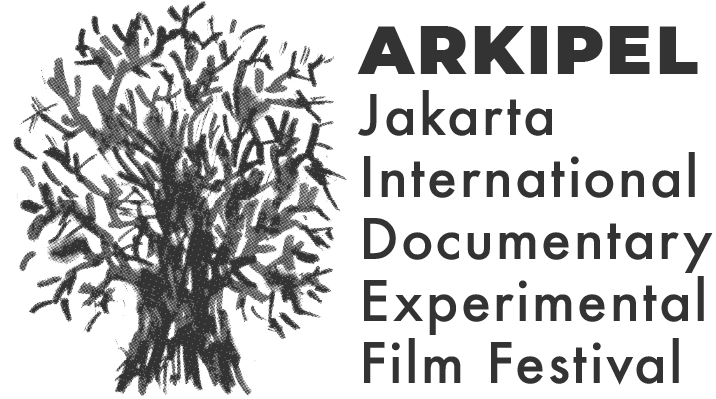Kamera yang Berempati, Wilayah yang Berirama dan Lanskap yang Penuh dengan Memori
26 Agustus, 2015, bertempat di Blitz, Pasific Place Jakarta, terdapat 2 rangkaian kegiatan dari ARKIPEL Grand Illusion – 3rd Jakarta International Documentary & Experimental Film Festival. Rangkaian kegiatan pertama yang dimulai tepat pukul 17.00, adalah program kuratorial berjudul Kamera yang Empati, Mengirama Teritori (atau Camera Empathy, Rhythm of Territory) dikuratori oleh Manshur Zikri. Dalam kuratorial yang dihadiri oleh 12 penonton ini, dtayangkan sebuah filem, berjudul Storm Children, Book One (2014) karya Lav Diaz dari Filipina.
Filem dokumenter eksperimental karya Lav Diaz ini mengangkat kisah kehidupan di Tacloban, Filipina, yang diterpa Badai Yolanda pada tahun 2013. Topan ini menghancurkan rumah-rumah warga dan memakan banyak korban jiwa.
Dari awal filem ini tayang, penonton disuguhkan pengambilan gambar hitam putih yang statis dengan berbagai shot yang durasi dari satu ke lainnya cukup lama bagi yang terbiasa menonton filem-filem biasa. Bahkan rasanya, pesan yang ingin disampaikan Lav Diaz baru mulai dapat diinterpretasi di tengah filem, penonton dibuat bertanya-tanya dengan maksud dari teknik pengambilan gambar Lav Diaz yang tak biasa ini. Alhasil, beberapa penonton tertidur dan terlihat keluar ruangan, mungkin tak tahan dan tak sabar untuk mengetahui maksud yang biasanya langsung tersurat di sinema.

Storm Children, Book One (2014) by Lav Diaz
Yang brilian dari Lav Diaz adalah kemampuannya untuk membaurkan kameranya dengan penduduk di daerah Tacloban sehingga tak menganggu aktivitas dan perilaku keseharian subjek-subjek yang disorotnya. Ia pun mengenalkan kepada penonton keadaan pemukiman yang menjadi wilayah sorotnya bukan dengan perspektif kamera yang “menunjukkan” tapi “merasakan”. Itulah empati dari kamera yang mampu ia buat, menghilangkan jarak antar kamera dan warga.
Tak hanya kepiawaiannya dalam menjadikan kameranya berempati, ia juga pandai dalam membidik objek-objek sentral seperti kapal atau aktivitas penduduk yang kemudian dijadikannya sebagai tanda untuk memancing interpretasi pada penonton. Bidikannya ini kebanyakan saling berbalas, sehingga menunjukkan tata ruang dan area gerak orang-orang yang di bidiknya.
Lima menit setelah Program Kuratorial itu selesai, pada pukul 19.35, Jangwook Lee memulai Special Presentation dari Space Cell, dengan judul kurasi Memory of/on Landscape. Lee mengangkat tema mengenai memori, yang seiring perkembangan waktu, dalam rekaan ingatan manusia, akan memudar. Lee berkata, “Kita mempunyai memori yang bentuknya tak bisa disentuh, tapi dapat ditemukan di tempat di mana ruang dan waktu berhenti.” Itulah lanskap yang diangkat pada tema ini. Lima filem yang diputar yang semuanya adalah produksi Korea Selatan, meskipun merekam lokasi dan kehidupan di luar Korea, menunjukkan memori yang ditangkap dari potongan-potongan lanskap sehingga terbentuk suatu memori utuh tanpa keraguan pada detailnya.
Filem pertama berjudul Masarap Na Kanta atau Delicious Song karya Inhan Cho mengambil latar di Pelabuan Brooklyn. Berkisah tentang kehidupan dari awak kapal yang menjalani pekerjaan di ruang lingkup kapal pesiar mewah. The Last Poem karya Sung Kwon Jeon berangkat dari puisi terakhir Robert Desnos yang meninggal karena tipus dan di dalam kantongnya ditemukan puisi yang didedikasikan untuk sang istri. Go Eun Im membuat karya Because the Outside World Has Changed… ke dalam dua episode. Episode pertama berkisah tentang pengalaman dari pribadi orang terakulturasi, sedangkan episode kedua berisi tentang eksplorasi arsitektur interior dari bekas Filmmuseum Amsterdam, dalam proses transisi menjadi TV media center. Filem terakhir adalah karya Jangwook Lee sendiri, berjudul Lazimpat yang dibuat dari footage hasil rekaman atap rumah. Berisi potret tentang orang-orang, matahari, dan hal indah lainnya.
Pada sesi diskusi, Yuki Aditya, Direktur Festival ARKIPEL yang saat itu bertindak sebagai host, bertanya tentang filem-filem yang ditampilkan, yang kesemuanya tidak di-shoot di luar Korea. Menanggapi pertanyaan Yuki itu, Lee menjawab bahwa semua filem itu memang tidak dibuat di Korea. “Seiring pembangunan Korea hingga hari ini, kita tidak akan lagi menemukan lanskap di Korea. Jadi, kita hanya menemukannya di image-image,” jawab Lee.
Dari 7 orang yang hadir, sedikit yang bertanya tentang presentasinya. Kemudian Yuki lanjut bertanya tentang perkembangan filem eksperimental di Korea Selatan, terutama tentang EXiS.
“EXiS baru 12 tahun bergerak di jalur filem eksperimental di Korea Selatan. Awalnya hanya sedikit yang tertarik, namun dengan melihat dari luar negeri, belajar sejarah, dan membuka lokakarya filem eksperimental, komunitas dalam bidang ini muncul dan terus berkembang,” jawab Lee.
–
26 August 2015, at CGV Blitz, Pacific Place Jakarta, there were two series of events from ARKIPEL Grand Illusion – 3rd Jakarta International Documentary & Experimental Film Festival. The first series of events that started exactly at 17.00, is a curatorial program called Camera Empathy, Rhythm of Territory, curated by Mansur Zikri. The program attended by 12 spectators, presented a film, entitled Storm Children, Book One (2014) by Lav Diaz from the Philippines.
This Lav Diaz’s experimental documentary film picked up the story of life in Tacloban, Philippines, which was hit by a storm in 2013. Yolanda Typhoon was destroying people’s homes and killed many.
From the beginning of the film showed, the audience was delivered with a static black and white image with various shots which duration from one to the other were long enough for those who are accustomed to watching mainstream films. In fact, it seems like Lav Diaz’s message can only be interpreted in the middle of the film, where the audience were made to wonder about the intention of this unusual shooting technique. As a result, some of the audience fell asleep and exited the studio, probably do not stand and cannot wait to find out the purpose that is usually written directly in the cinema.
What makes Lav Diaz is brilliant is his ability to blend his camera with the Tacloban people, so it won’t disturb the activity and everyday behavior of the subjects whom he shot. He introduced the audience to condition of areas which he shot, not with a camera perspective that “shows” but “feels”. That is the empathy from a camera that he is able to created, eliminating the distance between the camera and the people.
Not only his skill in creating camera empathy, he’s also proficient in targeting central objects such as ships or activity of the people to become a sign to lure interpretation to the audience. This aim mostly mutually reciprocated, thereby demonstrating the spatial and area of motion of the people he aimed.
Five minutes after that Curatorial Program ended, at 19.35, Jangwook Lee started the Special Presentation of Space Cell, with the title of curation Memory of / on Landscape. Lee raised the theme of memory, which, over the time, will fade. Lee said, “We have a form of memory that cannot be touched, but can be found in places where space and time stopped.” That’s why landscape is raised on this theme. All of the five films were South Korean production, despite they recorded the location and life outside of Korea, showing captured memories from the pieces of the landscape, forming an intact memory without a doubt on the details.
The first film entitled Masarap Na Kanta or Delicious Song by Inhan Cho, taking Brooklyn Port as background. It told about the life of the crew who had jobs in the of a luxury cruise ship. The Last Poem by Jeon Kwon Sung departed from the last poem of Robert Desnos who died of typhoid. In his pocket, found a poem dedicated to his wife. Go Eun Im created Because the Outside World Has Changed … into two episodes. The first episode was about personal experiences of acculturated people, while the second episode was to explore the interior architecture of the former Filmmuseum Amsterdam, in the process of transition into a TV media center. Jangwook last film was the work of Lee himself, titled Lazimpat made of footage from the roof of the house. It contained portraits of people, sun, and other wonderful things.
In the discussion session, Yuki Aditya, Festival Director ARKIPEL who was there as host, asking about the films that have been shown, which all of them were made outside Korea. Responding to Yuki’s question, Lee replied that indeed, all of the film was not made in Korea. “As the development of Korea to this day, we will no longer find a landscape in Korea. So, we only find it in the images, “said Lee.
Of the seven people who were present, not many asked about his presentation. Yuki then further inquired about the development of experimental film in South Korea, especially about Exis.
“It’s been 12 years that Exis has engaged in experimental film in South Korea. Initially there was little interest, but by looking from abroad, studying history, and open experimental film workshop, a community in this field emerged and continues to grow, “said Lee.

